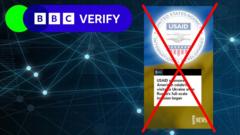The digital age has given rise to an overwhelming flow of information, which can often include misleading or outright false claims. Recently, a video alleging that the United States Agency for International Development (USAID) paid millions to Hollywood stars for their visits to Ukraine gained significant traction online. This clip, which has been amplified by influential accounts including that of tech mogul Elon Musk, quickly caught the attention of social media users.
However, the video has been debunked as fake, with experts pointing out the characteristics of Russian disinformation tactics embedded in its narrative. According to BBC Verify's Olga Robinson, the propagation of such misinformation raises serious concerns about the integrity of information shared in times of conflict.
The dissemination of inaccurate information not only misleads the public but also can have detrimental effects on international perceptions and responses to ongoing situations, such as the conflict in Ukraine. As misinformation continues to proliferate on social media platforms, it underscores the need for vigilance and critical thinking among users.
Efforts to combat this trend involve fact-checking and robust verification processes, as highlighted by various media outlets, including the BBC. Such initiatives are crucial for ensuring that accurate information prevails over deceptive tactics aimed at undermining public trust and creating division.
















